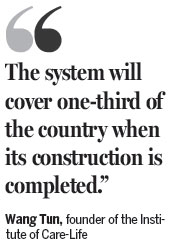Nepal to get early warning system
Updated: 2015-08-05 07:45
By Huang Zhiling in Chengdu(China Daily USA)
|
||||||||
An early warning system for earthquakes will be built in Nepal, the Institute of Care-Life in Chengdu, Sichuan province, and the Nepal Academy of Science and Technology announced on Tuesday.
The announcement came 100 days after the magnitude-7.8 Nepal earthquake that killed 8,699 people.
"With a cost of $3 million, the system includes 120 early warning sensors, one earthquake early warning center and terminals to receive earthquake early warning messages for schools and communities," said Wang Tun, founder of the Institute of Care-Life, the system's creator.
"The system will cover one-third of the country when its construction is completed. Nepal will be the fourth country in the world with an earthquake early warning system, following Mexico, Japan and China," he said.
The epicenter of the Nepal earthquake was about 90 kilometers from Kathmandu, the capital. People there would have been warned of the 18 seconds before seismic waves reached them had such a system been in place, and thousands of lives could have been saved, according to Jiba Raj Pokharel, a leading official at the science academy.
A real-time system that provides warnings seconds after an earthquake can save lives in a quake because the warnings are transmitted via radio waves, which travel faster than seismic waves through the ground.

"Radio waves travel at 300,000 kilometers per second, while seismic waves travel at 3 to 6 kilometers per second. People who live in nearby areas may escape before the seismic waves arrive," said Chen Huizhong, a senior research fellow with the Institute of Geophysics under the China Earthquake Administration.
"China only started attaching importance to early warnings after the Wenchuan earthquake," said 72-year-old Chen, who has studied quakes for 48 years.
After the magnitude-8.0 Wenchuan earthquake in Sichuan in May 2008, which killed nearly 70,000 people, Wang, a postdoctoral fellow of theoretical physics at the Austrian Academy of Sciences, set up the Institute of Care-Life in Chengdu to conduct research into early warning systems.
The institute first succeeded in providing an early warning for a destructive magnitude-4.9 earthquake in Qiaojia in Yunnan province on Feb 19, 2013, Chen said.
"It was the country's first successful warning of a destructive earthquake," said Chen.
Since 2013, Wang's institute has sent correct early warnings after 27 earthquakes above magnitude-4.5. Now the system has been installed in all Chinese provinces covering 2.1 million square kilometers.
huangzhiling@chinadaily.com.cn
(China Daily USA 08/05/2015 page5)

 Tsingtao gets ready for huge beer festival in China
Tsingtao gets ready for huge beer festival in China
 Stunning Shu brocade and embroidery techniques
Stunning Shu brocade and embroidery techniques
 Kazan games: Diving in the sky
Kazan games: Diving in the sky
 Torrential rain wreaks havoc in Jinan
Torrential rain wreaks havoc in Jinan
 A glimpse of Chinese cultural relics in foreign museums
A glimpse of Chinese cultural relics in foreign museums
 Flying Tigers show in New York
Flying Tigers show in New York
 Kobe Bryant frenzy grips Guangzhou
Kobe Bryant frenzy grips Guangzhou
 Three generations keep traditional lion dance alive
Three generations keep traditional lion dance alive
Most Viewed
Editor's Picks

|

|

|

|

|

|
Today's Top News
Obama issues challenge on climate change
GOPs begin pivotal debate week
Negotiation seen as key to China, US cyber solution
Beijing plans 'Silicon Valley' park for traditional culture
Obama issues challenge on climate change with power plant rule
China role crucial in UN plan
Biden associates resume discussion about presidential run
Malaysia seeks help to widen search for MH370
US Weekly

|

|





